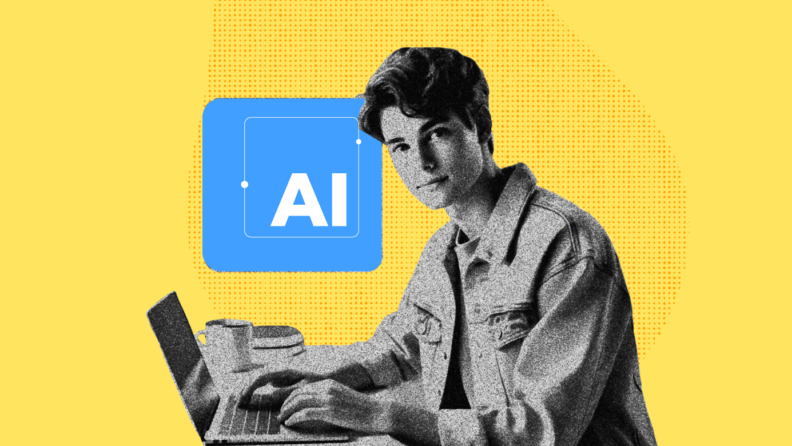Gen Z: The Future Tech Whizzes: Gen Z, the first true digital natives, are poised to lead workplace technology adoption with their adaptability and optimism, bringing new ways of working to the forefront.
AI Trust: The New Career Coach: With 47% of Gen Z trusting AI for career advice over managers, this generation signals a shift in employee relations and illustrates their readiness for tech-driven development.
Learning Revolution Through AI: Gen Z expects AI-powered learning and development resources, pushing employers to incorporate these tools or risk employees taking matters into their own hands.
AI is showing up in the tools we use in the workplace every day, though some employers and employees are adopting it more quickly than others.
At the forefront? The youngest members of the workforce.
Gen Z, the first true digital natives, are growing in influence and will usher companies into a new era. Defying stereotypes about them along the way, Gen Z is bringing an ability to adapt to changing tech and new ways of working.
Understanding how this generation can drive how you employ AI to meet expectations and improve employee learning and experience will help you attract (and keep) top talent from every generation.
Why Gen Z Is Poised to Lead the Shift
Gen Z isn’t the first generation to advocate for technological advances in the workplace. Millennials, for example, helped workplaces integrate their use of Slack and video conferencing tools and have long been proponents of updating the approach to training.
The difference is that while all generations are adapting to and using newer tech in their jobs, Gen Z is more optimistic about it than their predecessors.
A recent survey shows 64% of Gen Z employees view emerging technologies positively, compared to just 46% of Baby Boomers. They’re ready and willing to bring the tech they’ve used at home and school into their places of business.
AI and the Employee Experience
Raised with smartphones and AI-powered assistants, Gen Z employees anticipates intuitive, personalized, and tech-first approaches at work.
This expectation isn’t just a result of familiarity with or admiration for new tools. These young workers also place a lot of trust in the technology.
According to recent TalentLMS research, 47% of Gen Z employees trust AI for advice more than their managers when it comes to career advice. While this definitely indicates a problem with employee relations for managers, this also signals an understanding of the tools' capabilities and a readiness to embrace tech-driven solutions for career development.
According to Deloitte's 2024 Gen Z and Millennial Survey, Gen Z employees who regularly use AI tools report higher job satisfaction, trust, and excitement for the future. AI has a meaningful impact on the employee experience for upcoming talent.
What does this mean for you as an employer?
Organizations that resist adopting new technologies risk alienating younger talent and falling behind in innovation.
Those willing to embrace new tools don’t just stay on the cutting edge of technology. They also foster more engaged employees who are satisfied with their jobs, which means higher productivity and less turnover.
At these early stages of AI adoption, however, research suggests that only about 16% of employees are "very comfortable" using AI. What this points to is an opportunity for employers to educate around AI and help the rest of the workforce experience the same benefits and comfort Gen Z is leading the way on.
How Gen Z Is Driving AI-Powered Learning
The strategic shift that will most help you meet employee expectations is applying AI to employee learning and development.
As Gen Z enters the workforce, they expect companies to use and embrace emerging technologies. They already use these tools in their personal lives, and they’ll inevitably rely on the same technology for their jobs as they do for everything else.
Younger employees aren’t afraid to improvise—DIY-ing training on new technologies if employers don’t lead the way.
The approach is resourceful but could be problematic if:
● Younger employees aren’t trained by the company, they won’t necessarily learn the ethics and compliance aspects of the training content, leaving you open to potential compliance breaches.
● Different approaches to learning and application lead to friction in workflows, team dynamics, or employee-manager relationships.
To keep up with and meet expectations in L&D, you must adapt to the shift in training methods AI is creating.
Employee development programs have moved from instructor-led training to blended learning to AI-driven, adaptive learning systems. To keep up with these changes, you must know how to integrate AI effectively into your training efforts.
Use AI to:
Cater to different learning strengths
AI-enabled training can accelerate content creation and make it more adaptive to support employees' best learning styles. For example, it can detect which elements learners engage with and automatically adjust the training path to prioritize these formats.
Make it easier to offer personalized learning paths
TalentLMS research shows that 73% of Gen Z workers want personalized training that adapts to their individual needs and learning pace. AI-driven learning management solutions can track and analyze an employee’s training progress, altering the training content to fill in gaps in understanding.
Ensure training doesn’t disrupt the work experience
Gen Z’s demand for flexibility is driving investment in technologies that support self-paced, mobile-friendly learning. For example, companies may leverage AI-powered platforms to create microlearning modules that fit seamlessly into daily tasks.
The Future of Work According to Gen Z: AI in HR
AI adoption doesn’t stop with training. Gen Z’s influence is already reshaping traditional industries by introducing agile practices and championing new technologies.
In addition to tools that impact productivity, companies will focus more on technologies that support wellbeing and work-life balance to align with Gen Z’s values.
Younger employees across generations are concerned with feeling supported as they pursue their future with your company. That means creating efficiency to maintain a balance between their personal lives and their careers.
It also means showing them you care about their development. Employees have increasingly demanded career growth—including upskilling or reskilling to stay relevant in their fields.
Companies need to respond by increasing the adoption of AI in HR processes such as recruitment, onboarding, performance evaluations, and career pathing.
For instance, a well-designed and easy-to-use learning management system (LMS) can help employees start on the right path with structured, focused onboarding. AI can analyze individual learning styles and provide customized training materials and support.
AI analysis of LMS-distributed employee surveys can help you identify potential issues and suggest proactive solutions to improve morale and retention.
Steps to Staying Competitive
Changing the way you work can feel overwhelming. But with a thoughtful approach, it doesn’t have to be.
Start by auditing existing technologies and learning systems. Do they meet Gen Z’s expectations for personalization and innovation? What could be improved? Are you prepared to support them as they work toward their career goals?
Once you’ve pinpointed gaps, invest in the relevant tools to do the following:
- Create a seamless hiring experience with AI
Whether it's the use of AI-powered chatbots for real-time candidate engagement, AI-driven resume screening to reduce bias and speed up the hiring process, or AI-driven skill assessments that are interactive and gamified to appeal to Gen Z’s tech-savviness, there's a lot of room for AI in your recruiting process.
2. Personalize career development
Implementing AI-driven learning platforms that recommend personalized upskilling opportunities could be just the tip of the iceberg. Mentorship programs could even be driven by AI, matching Gen Z employees with senior professionals based on skills and interests.
3. Ethical AI usage
Be transparent about how your company uses AI in decision-making and involve employees in discussions about AI’s impact on workplace ethics and career security. This level of transparency will help align people's values with how the company is deploying AI.
4. Highlight your AI wins in employer branding
Showcase how your company uses AI to drive innovation in its industry. Feature employee success stories where AI helped them excel in their roles and promote AI-related hackathons, upskilling programs, and thought leadership to attract tech-savvy Gen Z candidates.
Collaborate for a Brighter AI-Driven Future
As Gen Z continues to shape the workplace, companies have two choices: resist and fall behind, or embrace their tech-forward vision and thrive.
Gen Z is not just prepared to enter the AI age—they’re already leading us there. Meet them where they are, listen to employee perspectives, and adapt.
Working with the expectations of the incoming generation will prepare your organization for success in the present and allow it to pivot to whatever the future holds.
What's Next?
Want to keep up with the latest developments around emerging technology and the workplace? Sign up for the People Managing People newsletter and get all the latest insights, expert advice and tips for success straight to your inbox.





